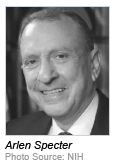The American Association for Cancer Research (AACR) mourns the loss of Arlen Specter, who represented Pennsylvania in the U.S. Senate from 1981 to 2011. With his passing, the cancer research and biomedical science community lost one of its greatest supporters and promoters.
During his five terms and 30 years in the U.S. Senate, Senator Specter served as a tireless champion in the fight against cancer and was the driving force behind strengthening America’s leadership in securing sustained funding for cancer research and biomedical science.
Margaret Foti, PhD, MD (hc), AACR’s Chief Executive Officer noted that “for years, Senator Specter was one of the most ardent advocates for increased spending for the National Institutes of Health, which has resulted in countless lives being saved. All of us are indebted to him for his vision and his extraordinary legacy.”
Influential Supporter of Cancer Research
During his tenure in the Senate, Senator Specter served on the House Appropriations Subcommittee on Labor, Health and Human Services, Education, and Related Agencies, which is the subcommittee responsible for allocating funding for the NIH. He served as chairman for 10 of those years, during which time he asserted his status as one of the most influential supporters of cancer and biomedical research.
Senator Specter was the driving force in accomplishing the 5-year doubling of the NIH budget, which was completed in 2003. In addition, his courageous support of an amendment to the American Recovery and Reinvestment Act in 2008 led to an additional $10.4 billion to support the work of the NIH, including the National Cancer Institute.
“Senator Specter brought a powerful and personal voice to the fight against this terrible disease. His personal strength in battling cancer while carrying on his critical duties in the U.S. Senate was a tribute to his courage and dedication to biomedical research in this country,” Dr. Foti added. “His unwavering support has truly made a difference in the lives of millions of cancer survivors, patients, and their families across the nation.” ■


